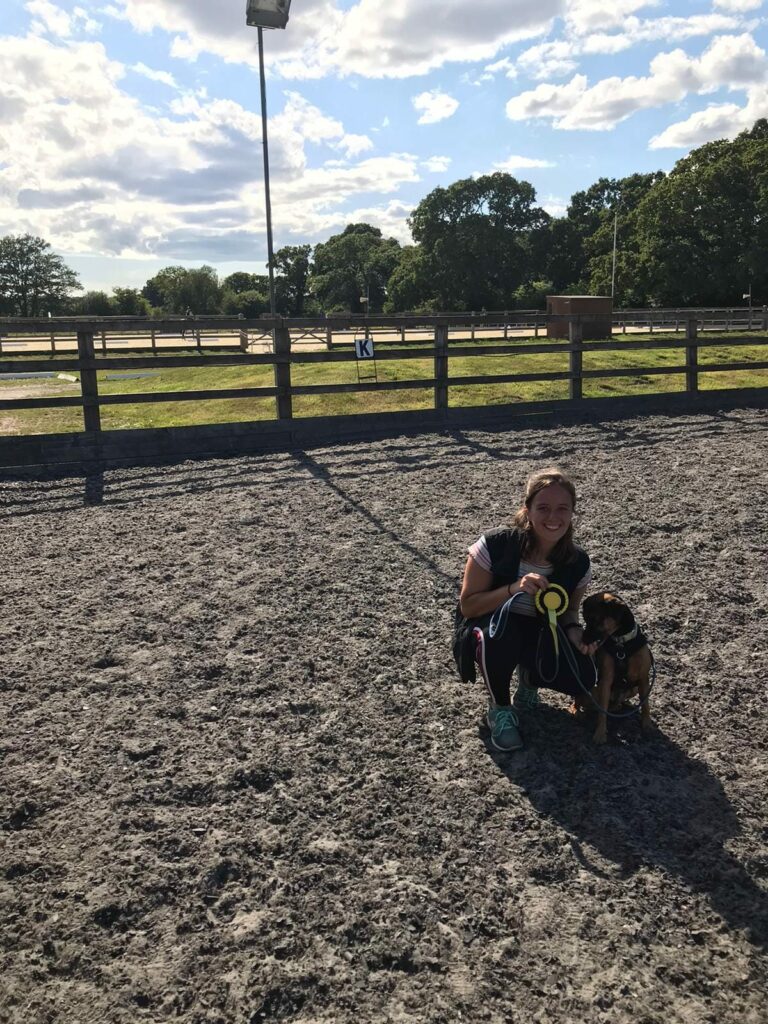Dog training is a physical skill. It involves a lot of different aspects, both human and dog, and that’s before you’ve even looked at the environment you’re in! I often get told that I make an exercise look easy. The truth is that I should! I spent my life training dogs, working with my own dogs and constantly finding better ways to teach something or practicing something that I’m not very good at because I need to have those skills honed in order to help my clients effectively. But I desperately want my clients to know that I don’t expect them to perform their side of an exercise perfectly once, let alone all of the time!

Dogs are an incredibly forgiving species to work with. Even if we as the human trainer are shocking at training the dog, quite often we can muddle through and get the behaviour we want despite our training not being perfect. I recognise that my clients are learning as well as their dogs. The instructions I give during classes are designed so that the human half can focus on one thing they need to do in order to have some success with their dog. Once they’ve mastered that one thing, then I’ll give them another to make their side of the equation more effective.
Because I recognise this and understand what it’s like to find training a dog difficult (given that I do it with other trainers 3+ times a week!) I don’t expect my clients to be perfect all the time. Often people apologise when they get something wrong and I wish that their feeling like they have to apologise didn’t exist! I completely understand when we muddle things up. Even when I’m running through behaviours both me and my dogs know when I occasionally make a horrific mistake and have a laugh at myself because that behaviour has been solid for years but I just goofed it up. Making mistakes when teaching your dogs new things is not only okay, it’s expected! We’re only human and your dog will be fine if you’re not a perfect trainer. We’ll get there in the end and there’s no need to feel bad about learning!
In addition to the above, I wanted to add a quick confession to this post. I had a call with a client where they were upset because they were experiencing situations with their dog that they had no idea how to respond to. As the conversation progressed I was made aware of the fact that my client had no idea that I also have those moments. I organise a sports club for dog trainers in the local area and we get together every Monday to train together with a professional trainer coming in to coach us once a month. In one of these sessions Pumba did something and I looked around and asked the people I was training with if they had any idea how I should respond to it. None of us had a clue. Each person in the room has a dog training qualification and none of us had a single idea about how I should respond to this behaviour. With the above in mind, remember that not knowing what to do is part of the learning process sometimes and that even us trainers who can make things look really easy sometimes have no idea what to do.
What things do you find hardest about dog training? Have trainers you’ve worked with given you any lightbulb moments that completely resolved a brain block you were having about something? Please let me know down below! I’d love to hear about them!

I find it harder to repeat the training in a different environment, when we’re in class Jack is totally focused on me, that’s more difficult at home, or in the field.
There have been many light bulb moments, it all becomes clear when you’re training in group and everything is explained from a dogs point of view.
This is the tricky part for sure! Pumba can do pretty much anything we’re asked in class environments but it was such a challenge getting him to work in the real world. I always try to start with something I can implement easily in real life. For example, out on a walk, instead of asking for beautiful heelwork or doing some cooperative care, I’d wait for Pumba to offer me some eye contact before letting him off lead. Once he’s gotten used to that being routine it’s offer me eye contact, do some sits, downs and stands then I’ll let you off lead and so on! The trick is building training into parts of your everyday life so that it’s easy for you to work it into your routine and not have to think about it!